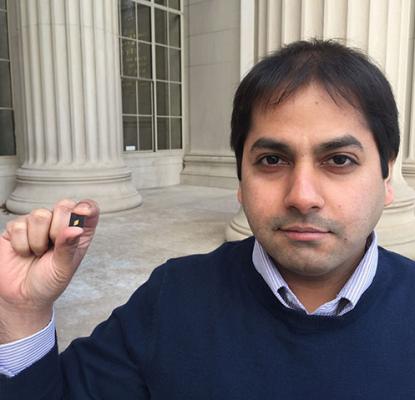Apoorva Murarka
Apoorva Murarka is a PhD candidate in electrical engineering at the Massachusetts Institute of Technology (MIT). His research focuses on micro- and nano-structured machines, commonly known as micro- and nano-electromechanical systems (MEMS and NEMS). His passion for MEMS and NEMS started long before he arrived in Cambridge.
Apoorva’s interest in machines began when he first studied electromagnetism in high school physics classes in Singapore and India. He was fascinated to learn how electricity and magnetism were applied by coupling electric charges, currents, or magnetic fields to mechanical systems, enabling everything from motors and generators to electric guitars. He learned about MEMS while exploring ways to electronically sense human motion and physical gestures. Driven by curiosity, he conducted further independent research. This led him to realize that existing fabrication technologies, based on conventional integrated-circuit processes, could be limiting both the form and possible functions of MEMS devices. In his own words, he’s been “obsessed with exploring the physics and design of micro and nano systems, such as mechanically active sensors and actuators, with novel dimensions, material sets, and applications” ever since.
Apoorva, who received bachelor’s and master’s degrees in electrical engineering from MIT, has worked in MIT’s Organic and Nanostructured Electronics Laboratory as both an undergraduate and a graduate student. He now focuses on the design, fabrication, and characterization of transfer-printed MEMS sensors and actuators that comprise mechanically active nanostructured membranes on various substrates, for applications such as microspeakers, microphones, vertical-cavity surface-emitting lasers, pressure sensors, and ultrasound transducers.
His work has led to more than a dozen granted and pending patents, seven publications in peer-reviewed and refereed journals, and numerous presentations at premier international MEMS research conferences since 2011. It also earned him the 2017 $15,000 Lemelson-MIT Student Prize in the “Use it!” category.
Throughout his career, Apoorva has shared his knowledge with younger people. During his pre-college “gap year,” he taught math and science classes for underprivileged elementary and middle-school students in New Delhi. In graduate school, he has mentored undergraduate and graduate lab members in scientific research projects and served as the head teaching assistant for MIT's introductory circuits and electronics course for electrical engineering undergraduates.
Apoorva notes that he benefited from the guidance of his own mentors, including MIT Professors Vladimir Bulović, Jeffrey Lang, David Perreault, and Kripa Varanasi; Dr. Ole Nielsen, research engineer at Bose Corporation; and Dr. Brian Anthony, associate principal research scientist for the MIT Institute for Medical Engineering & Science.


